Forge Motorsport Race Intercooler for the EA888 2.0 TSI Engine – FMINT32
د.إ3,980.00
Upon placing the order, we will get in touch with you to confirm the availability information.
For Instant Enquiry and More Details, Please Click Here
Did you like this product? Add to favorites now and follow the product.
Description
Highlights:
- Gains of 16BHP
- Gains of 20NM of torque
- Inlet air temp reduction (IATS) of up to 58%
- Made in the UK
- 76mm inlet and outlets (OEM 63mm)
- 83% volume increase over the OEM
- No cutting of the vehicle 100% plug and play
- High flow baffled cast end tanks ensuring optimum air transition for cooling efficiency
- Lifetime warranty

This part will replace the following OEM parts: 5Q0145803H, 5Q0145803K, 5Q0145803L, 5Q0145803P, 5Q0145803S, 5Q0145803N
Following on from our previous intercooler solution for the MK7 golf and MQB chassis variants that utilise the EA888 2.0 GEN3 2.0 TSI engine, we have designed our race intercooler to further enhance performance over the original intercooler and our previous iteration of our cooling solution, designed, developed and tested, at our headquarters in Gloucester UK. Throughout the development process we have strived to improve the efficiency and performance of the EA888 GEN3 engine. Our project brief was to develop an intercooler that utilised all of the available space in the original position of the OEM intercooler along with increasing the size again over our hugely successful product FMMK7FMIC. We also had to ensure the inlet air temperature is reduced, without any negative effects on the boost pressure or engine and transmission cooling.
In the MQB chassis the intercooler housing is particularly restricted and confined to a small amount of space, due to it not only housing the intercooler, but also the radiator and air conditioning condenser. The front panel in theory is a sandwich pack that houses the auxiliary cooling components. This means in order to increase the size of the intercooler without paying detriment to the performance of the surrounding items, and with also having very little extra space available, that it can be very difficult to execute the perfect blend of a high flow intercooler within such a close proximity. Our research and development engineers went back to the drawing board looking at previous documented dimensions while also taking new scans of the intercooler housing, this enabled the team to squeeze a further 10mm in depth of the core that houses very snugly into the earlier MQBs platform.
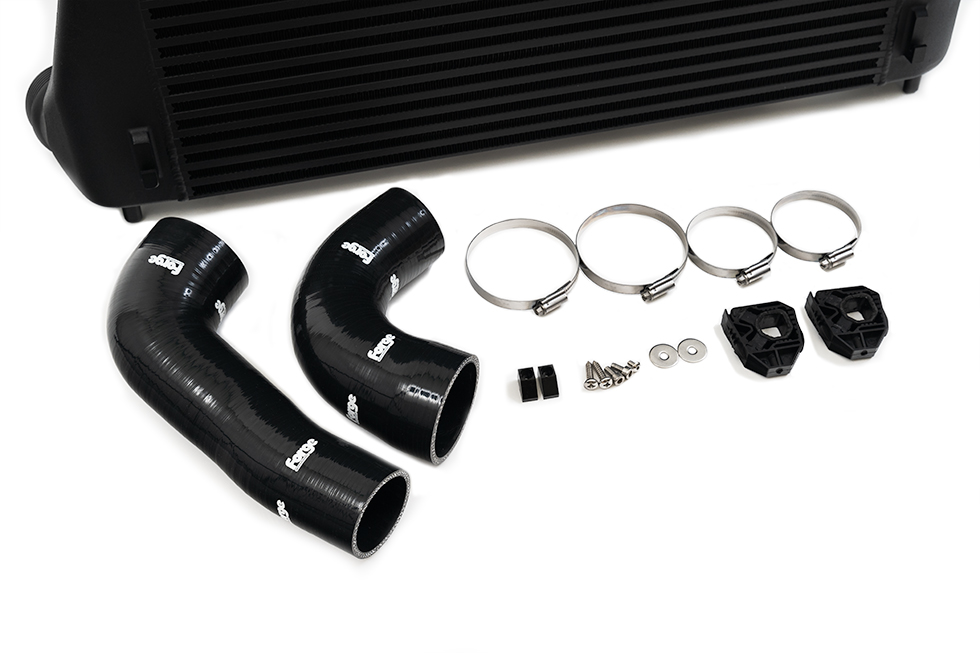
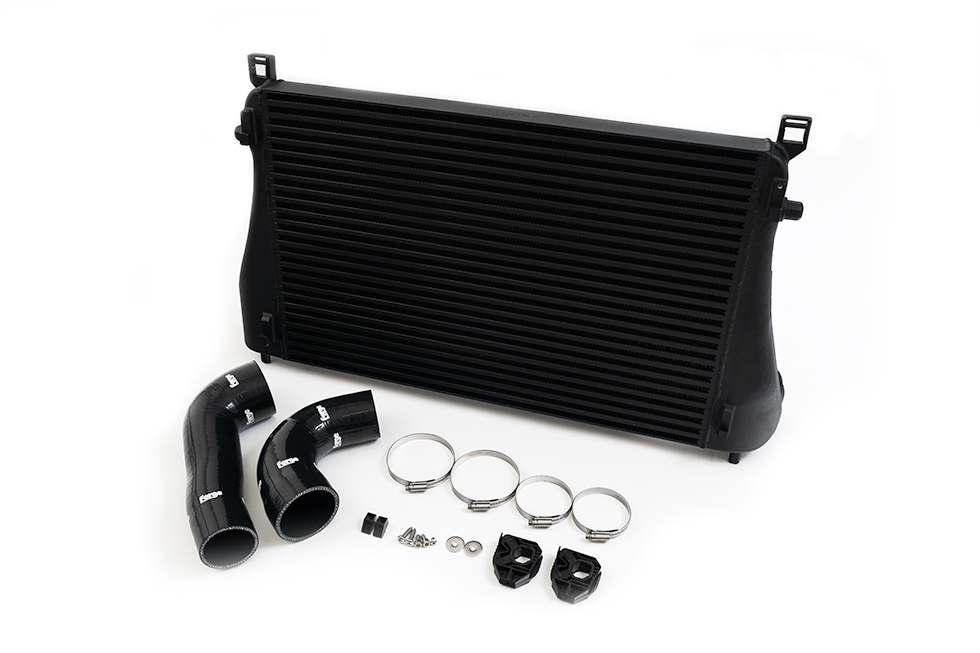
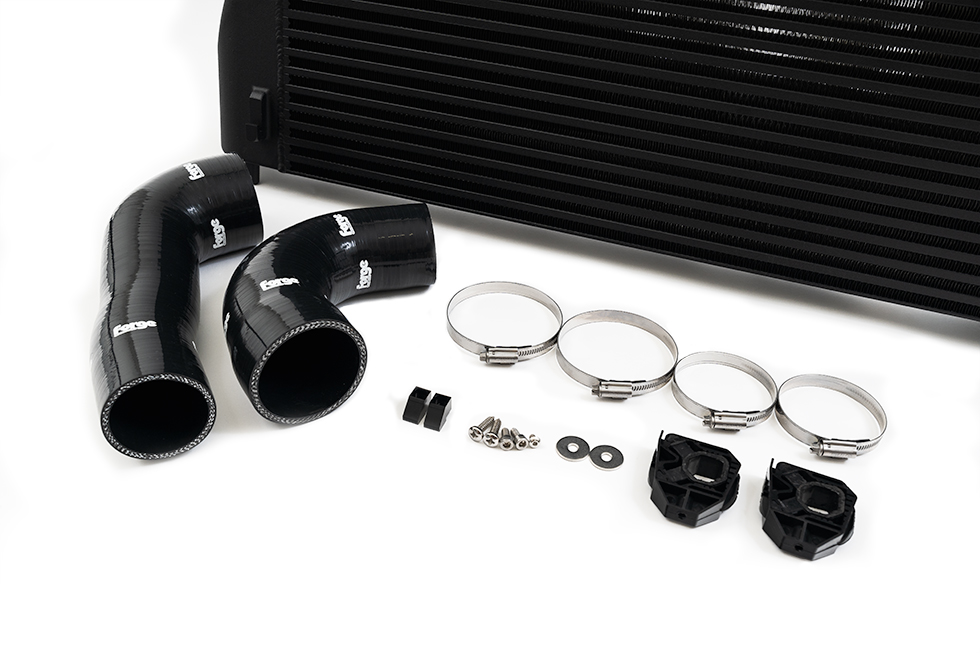
We also looked at the differences between the Mk7 and Mk8 cooling components and found that the Mk7 Golf GTI and Golf R has a thicker radiator than the MK8 equivalent models thus meaning we also needed to consider any fitment procedures carefully. The design team started to 3d print the intercooler end tanks while creating a test sample dummy core to fit to the Mk7s platform and check for any clearance issues that may occur. The final chosen design has increased inlet and outlet sizes along with increasing the volumetric capacity to increase flow which aids with future proofing the design to work well with highly tuned stage 3 plus EA888 Gen 3 engines as well as offering the best cooling solutions for either a stock or mildly modified powerplant. This gives the best package for the enthusiast as they start their journey in enhancing the vehicles performance.
The 3d printed end tanks and dummy core enabled us to ensure the fit was perfect on the vehicle before any prototype castings or machined billet end tanks were produced ready for dyno testing. Several baffle configurations were designed, and flow simulated to ensure the maximum performance was obtained to keep the core working at its optimum, along with ensuring all its cooling capabilities had been upheld, and that the total volume of the core internal is utilised for optimum performance.
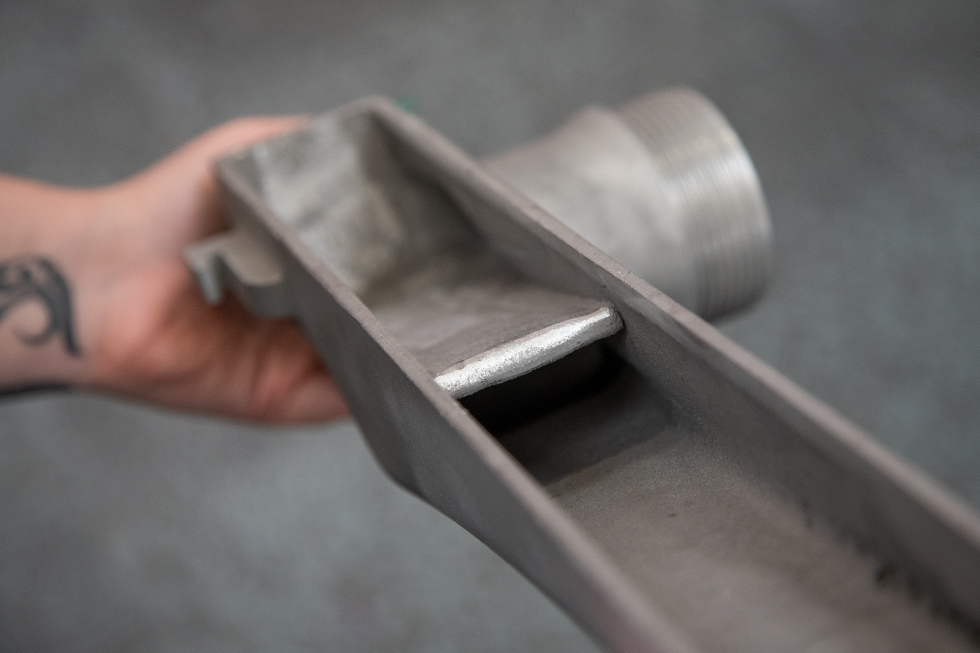
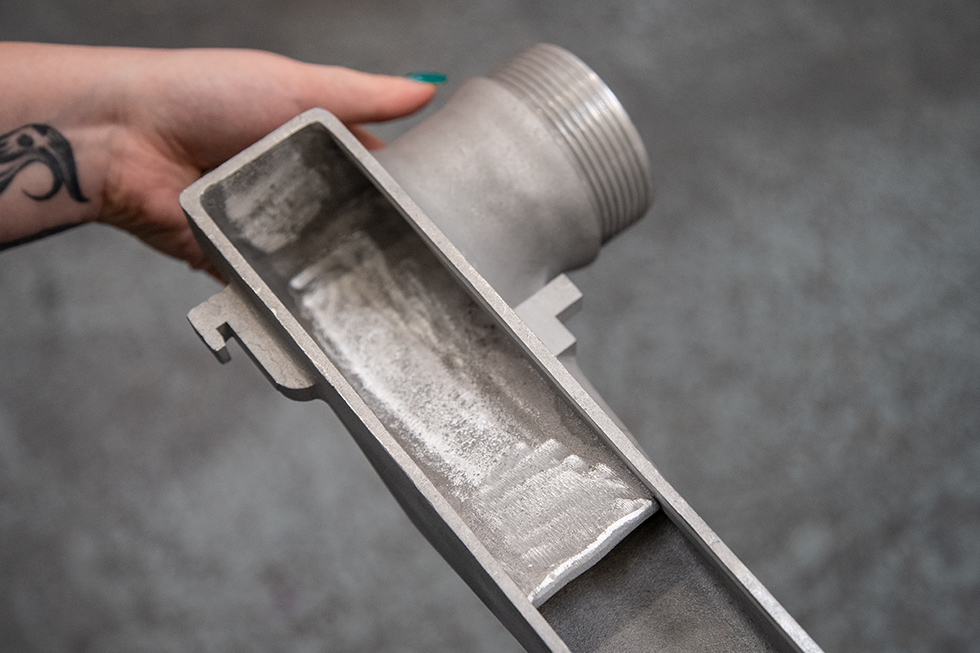
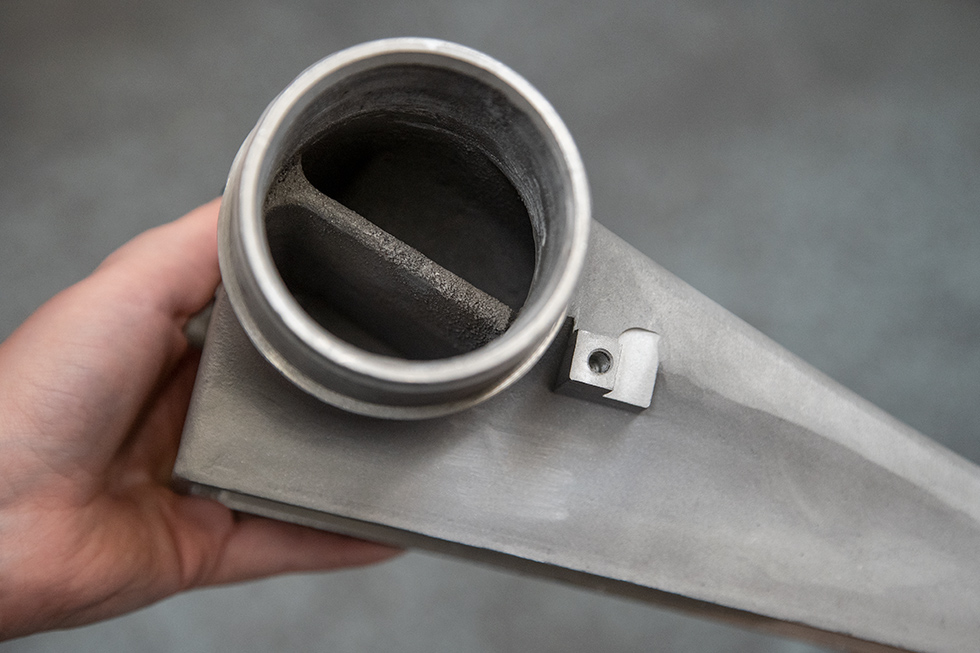
With an increase in inlet and outlet sizes, we then turned our attention to the design of our silicone hoses. With flow in mind, we have created a step within the hose so where the hose meets the hot and cold side of the inlet and outlet junctions the transition is seamless, this helps to lesson any disturbance to the airflow and prevent unwanted turbulence. To further aid with flow, the inlet and outlets have been increased to 76mm from the OEM size of 63mm which equates to a 45% increase in surface area.
The consideration of space and our clever design has led us to produce several intercooler cores with different fin configurations and internal capacities. Depending on the core design, testing results led us to choose a bar and plate design with over 83% more volume than the OEM intercooler, and with a frontal area increase of 10%.
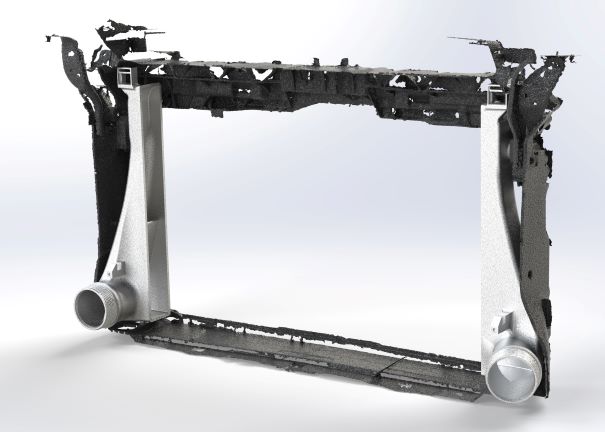
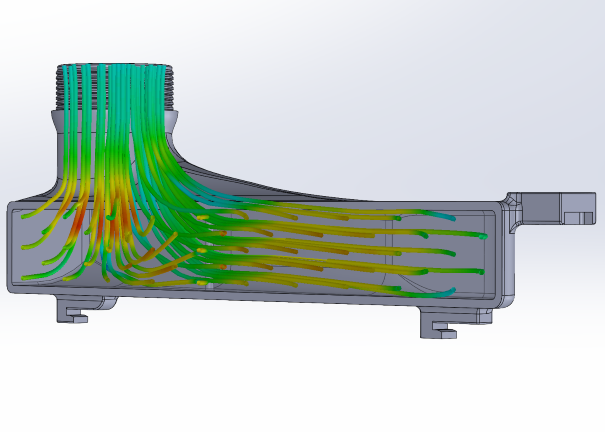

Why do we test different cores?
Here at Forge Motorsport, when developing an intercooler, we will test several different cores for each application. For example, a bar and plate style core, a tube and fin style core along with different fin pitches and heights i.e. 22 fins per inch or 17 fins per inch as well as changing the internal fin pitches/shapes and density within the tube enabling to fine tune the amount of pressure drop the intercooler produces.
Pressure drop is not always a bad thing, as our testing and research has proven on various projects, this is because the pressurized air velocity is being stalled by the pressure drop within the cooler thus allowing more time to cool the air within the cooler itself, as air passes through the non-pressurized face of the core, that is open to the atmosphere. Too much pressure drop can of course have a problem on the higher performance engines as the intercooler reaches its maximum efficiency the turbo has to work a lot harder to force the air through the core. This in turn creates higher inlet air temps (IAT’s) due to the turbo creating more heat as it is over stressed and worked harder. No pressure drop can also prove to be inefficient as the cooler will not lower the charge temperature again resulting in higher inlet air temperatures.
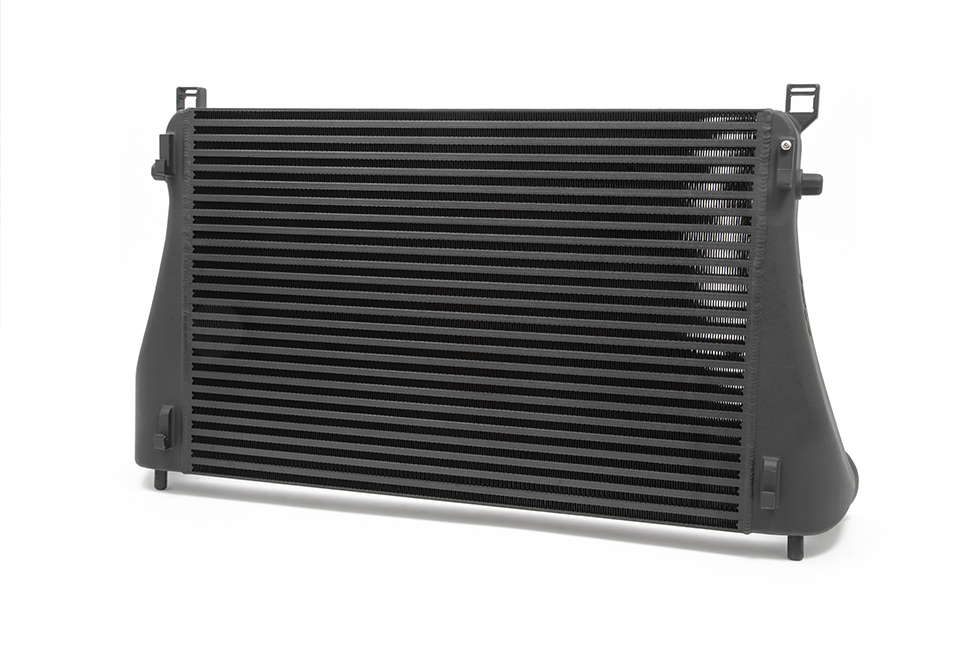
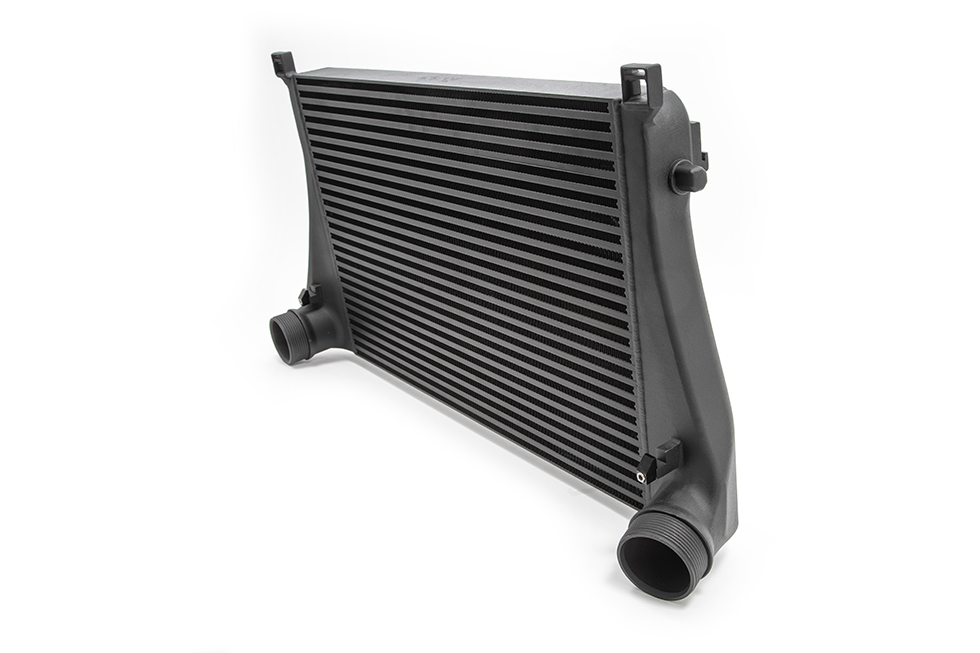
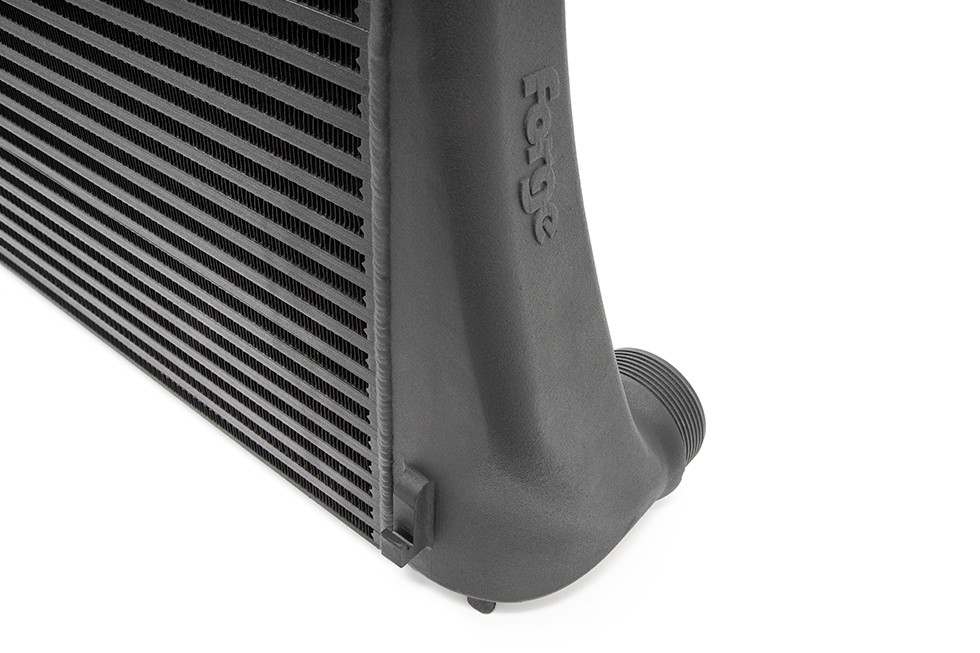

Dyno Results
Testing was completed using Performance Remap in Gloucester with their VTEC 4-wheel drive dynamometer; this was to ensure all our data has been achieved with results as accurately as possible by an independent tuner. Peak power was increased from stock by 16bhp and 20nm of torque at 5500RPM with the Forge Motorsport performance intercooler installed. The best news is that there are significant torque gains throughout the rev range, meaning that the car power will pick up quicker and pull the whole way through to redline, including an impressive gain in BHP increase from 5000 RPM TO 6500 RPM. Gains on vehicles with re calibrated software and further hardware performance parts can be expected to be a lot higher due to the substantial drop in IATS when FMINT32 is installed.

During our extensive testing, we let the car heat soak on the dyno until the radiator fans tripped on and off (which gives an inlet temperature of around 40°C), we then did a dyno pull from this point, in doing this it gives a more consistent result and reflects real-world driving conditions more accurately. You can easily see the Forge intercooler cools much quicker and delivers a much greater drop in temperature compared to OEM.
After more than six pulls on the dyno we still had super safe IAT’s, and the Forge Motorsport intercooler gave results of 34°C @ 6000 RPM giving a reduction of 58% over the factory’s intercooler intake temps from 58°C just before the rev limiter These tests took place in relatively hot conditions with an ambient dyno cell temperature of 23°C proving how inefficient the stock intercooler is. In the summer months, the stock intercooler along with higher inlet air temperatures will have a hugely negative impact on the engine’s performance. In these conditions, the engine management will retard the ignition, resulting in a lower powered engine as temperatures rise and the ECU then pulls out the timing to stop detonation. On a mapped vehicle, the results will be even more detrimental and can lead to possible premature engine wear. If you use a Golf R for fast road or have a high-performance tune in a hot climate, this product is essential.
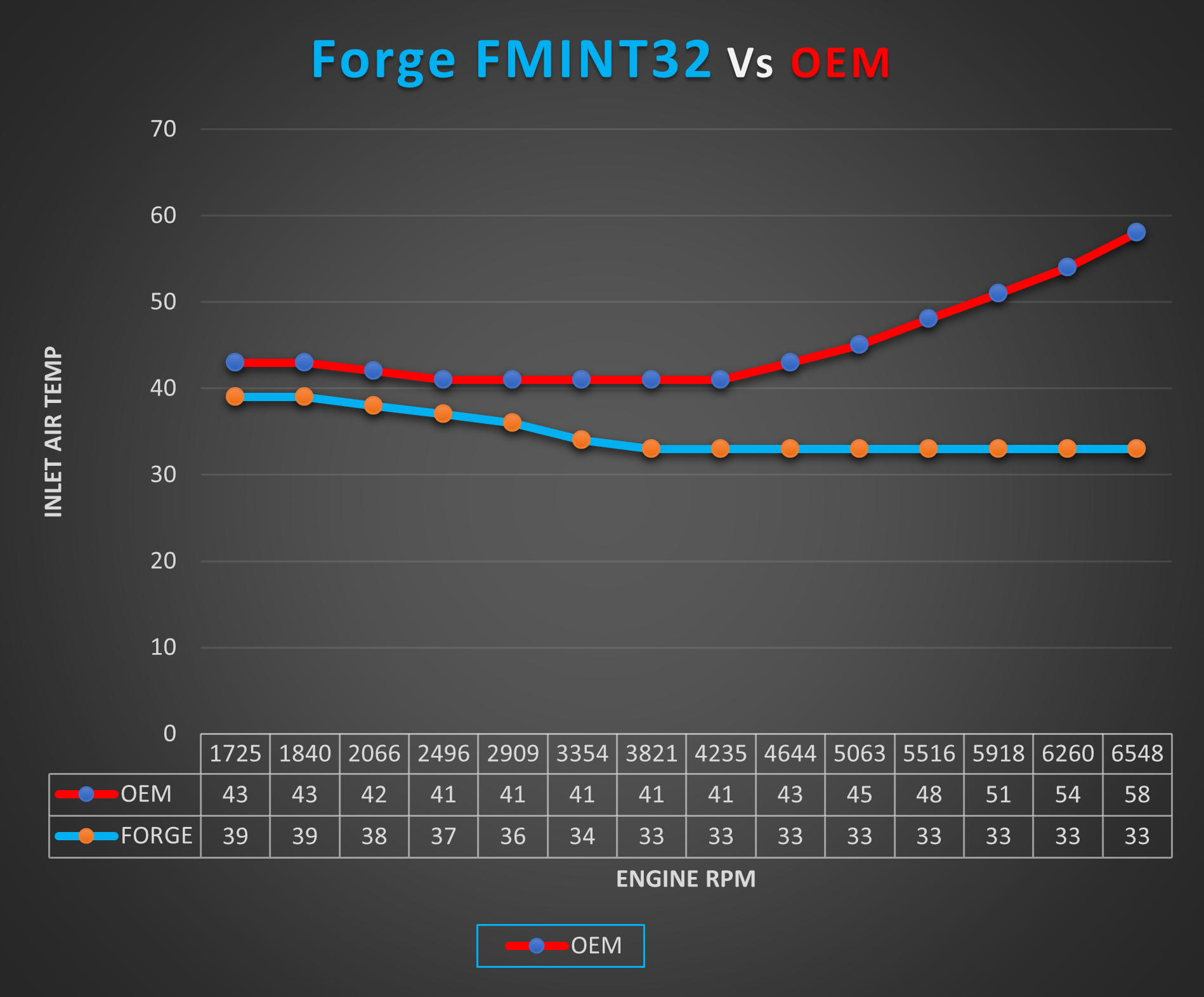

Why do we try to reduce IAT’s (Inlet Air Temperatures)?
Temperature and volume of air supplied to your vehicles engine that is compressed by the turbo charger has a better effect on performance when cool as this is to provide the engine with more oxygen (denser air), thus improving the combustion in each cylinder. In addition, by regulating and reducing the air temperature, it also increases the reliability of an engine by keeping the AFRs (Air Fuel Ratios) in each cylinder at a safe level, which in turn, can increase an engines power due to the air being cooler. A bigger bang is then created within the cylinder, providing the correct amount of fuel is added. This can equate to an increase in BHP and torque.
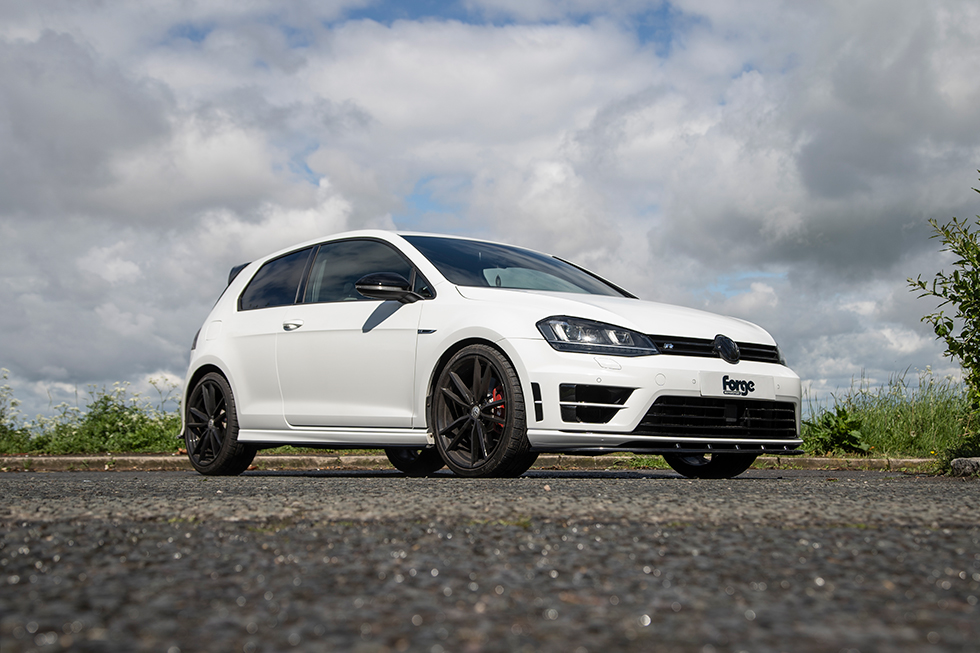
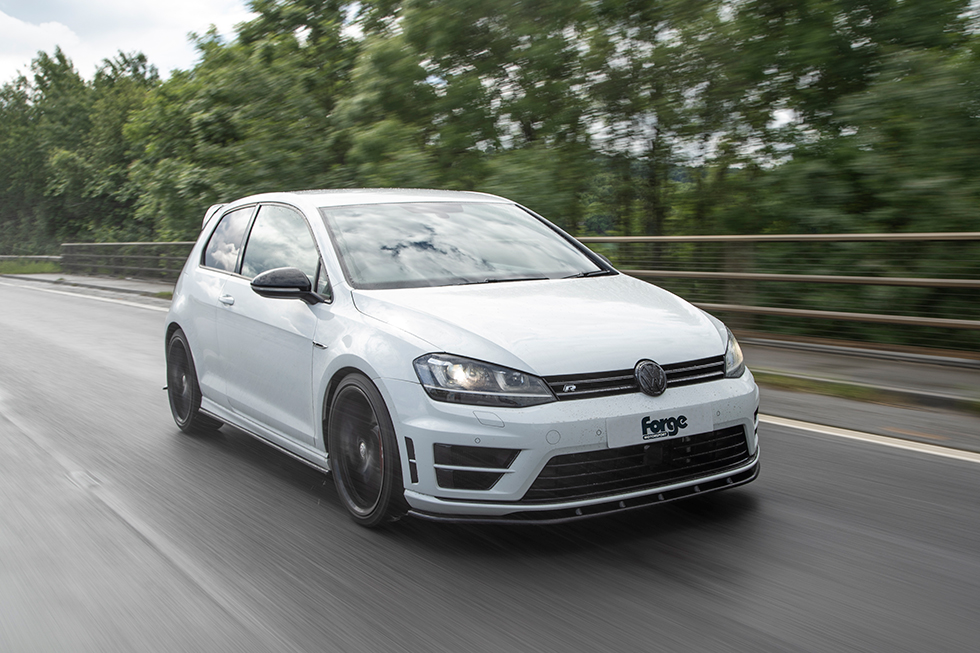
The Forge Motorsport intercooler is a perfect performance enhancing product that fits directly to the OEM mounting points, making for a simple install, in a relatively short period of time. No cutting of any components is needed, making the installation reversible if the vehicle needs to be returned to stock at any time in the future. The core and end tanks are finished in our black textured anti corrosion coating that also aids with its thermal properties and keeps the product looking that bit stealthier or OEM+. The Forge Motorsport lifetime warranty on all hardware products shows the trust we have in the quality of our products while they are being enjoyed on your pride and joy.
Compatible Vehicles :
Additional information
| Brand | Forge Motorsport |
|---|---|
| Make | Audi, Golf GTI, Golf R, S3, TT, TTS, Volkswagen |
| Model Year | 2013, 2014, 2015, 2016, 2017, 2018, 2019, 2020, 2021, 2022, 2023 |
Quick Comparison
| Settings | Forge Motorsport Race Intercooler for the EA888 2.0 TSI Engine - FMINT32 remove | CTS TURBO 4″ TURBO INLET PIPE FOR 8V AUDI RS3/8S AUDI TT-RS -CTS-HW-360 remove | CTS TURBO MK8 GOLF GTI TURBO OUTLET PIPE -CTS-IT-957 remove | CTS TURBO AUDI/VW 6-SPEED MANUAL & DSG/S-TRONIC DQ250 TURBO OUTLET PIPE (GTI/GOLF R/A3/S3/TT) 2015+ MQB MODELS -CTS-IT-275 remove | RACINGLINE OIL MANAGEMENT SYSTEM (CATCH CAN) 2.0TSI EA888 Gen.3 – VWR13G700 remove | VRSF HD Intercooler Upgrade Kit for 12-18 F20 & F30 228i, M235i, M2, 328i, 335i, 428i, 435i N20 N26 N47 N55 -103030 remove | ||||||||||||||||||||||||||||||||||||||||||||||||||
|---|---|---|---|---|---|---|---|---|---|---|---|---|---|---|---|---|---|---|---|---|---|---|---|---|---|---|---|---|---|---|---|---|---|---|---|---|---|---|---|---|---|---|---|---|---|---|---|---|---|---|---|---|---|---|---|---|
| Name | Forge Motorsport Race Intercooler for the EA888 2.0 TSI Engine - FMINT32 remove | CTS TURBO 4″ TURBO INLET PIPE FOR 8V AUDI RS3/8S AUDI TT-RS -CTS-HW-360 remove | CTS TURBO MK8 GOLF GTI TURBO OUTLET PIPE -CTS-IT-957 remove | CTS TURBO AUDI/VW 6-SPEED MANUAL & DSG/S-TRONIC DQ250 TURBO OUTLET PIPE (GTI/GOLF R/A3/S3/TT) 2015+ MQB MODELS -CTS-IT-275 remove | RACINGLINE OIL MANAGEMENT SYSTEM (CATCH CAN) 2.0TSI EA888 Gen.3 – VWR13G700 remove | VRSF HD Intercooler Upgrade Kit for 12-18 F20 & F30 228i, M235i, M2, 328i, 335i, 428i, 435i N20 N26 N47 N55 -103030 remove | ||||||||||||||||||||||||||||||||||||||||||||||||||
| Image | 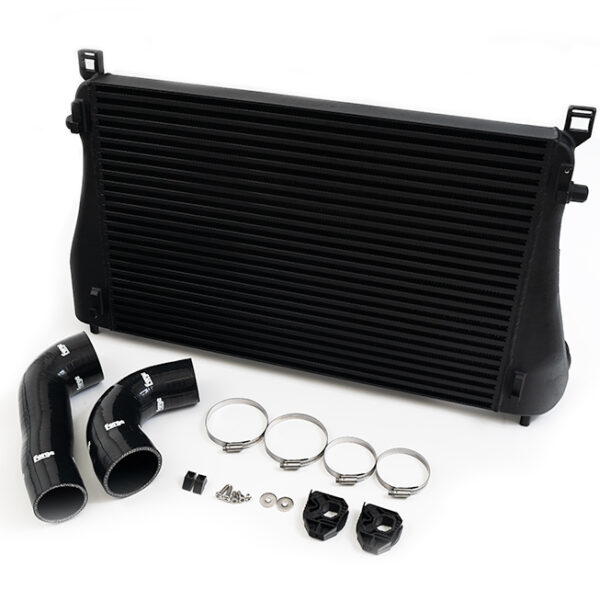 |  |  | 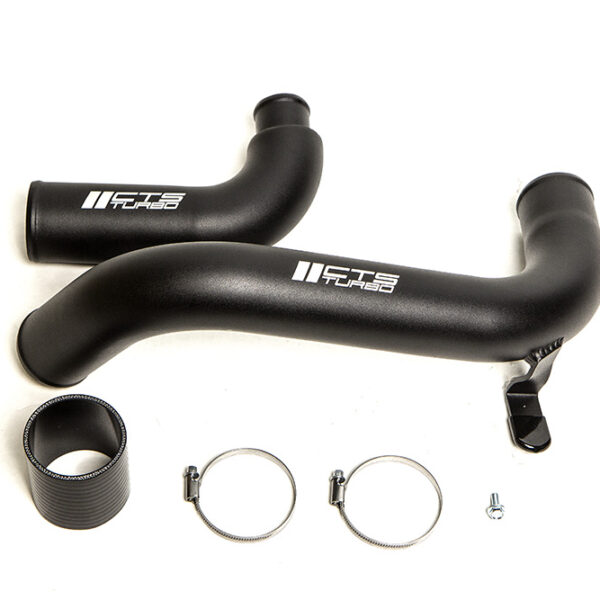 |  | 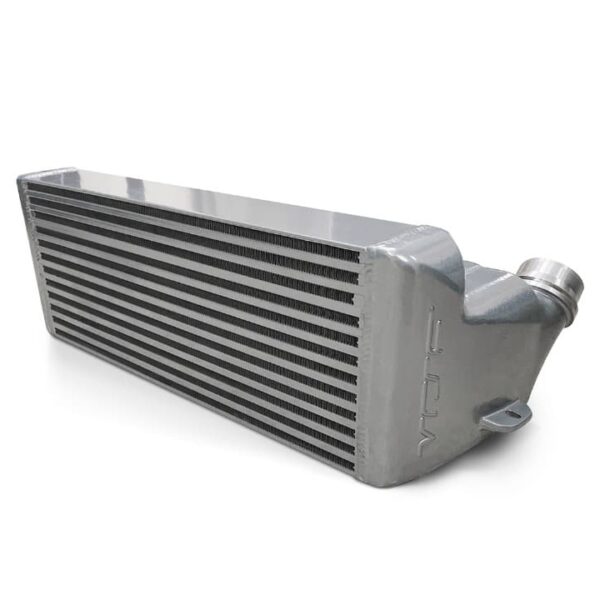 | ||||||||||||||||||||||||||||||||||||||||||||||||||
| SKU | FMINT32 | CTS-HW-360 | CTS-IT-957 | CTS-IT-275 | VWR13G700 | 103030 | ||||||||||||||||||||||||||||||||||||||||||||||||||
| Rating | ||||||||||||||||||||||||||||||||||||||||||||||||||||||||
| Price | د.إ3,980.00 | د.إ1,380.00 | د.إ980.00 | د.إ900.00 | د.إ2,920.00 | د.إ2,150.00 | ||||||||||||||||||||||||||||||||||||||||||||||||||
| Stock | In Stock
| In Stock
| In Stock
| In Stock
| In Stock
| In Stock
| ||||||||||||||||||||||||||||||||||||||||||||||||||
| Availability | In Stock | In Stock | In Stock | In Stock | In Stock | In Stock | ||||||||||||||||||||||||||||||||||||||||||||||||||
| Add to cart | ||||||||||||||||||||||||||||||||||||||||||||||||||||||||
| Description | Upon placing the order, we will get in touch with you to confirm the availability information. For Instant Enquiry and More Details, Please Click Here | Upon placing the order, we will get in touch with you to confirm the availability information. For Instant Enquiry and More Details, Please Click Here | Upon placing the order, we will get in touch with you to confirm the availability information. For Instant Enquiry and More Details, Please Click Here | Upon placing the order, we will get in touch with you to confirm the availability information. For Instant Enquiry and More Details, Please Click Here | This product will be in stock and available for purchase. | Upon placing the order, we will get in touch with you to confirm the availability information. For Instant Enquiry and More Details, Please Click Here | ||||||||||||||||||||||||||||||||||||||||||||||||||
| Content | Highlights:
 This part will replace the following OEM parts: 5Q0145803H, 5Q0145803K, 5Q0145803L, 5Q0145803P, 5Q0145803S, 5Q0145803N
Following on from our previous intercooler solution for the MK7 golf and MQB chassis variants that utilise the EA888 2.0 GEN3 2.0 TSI engine, we have designed our race intercooler to further enhance performance over the original intercooler and our previous iteration of our cooling solution, designed, developed and tested, at our headquarters in Gloucester UK. Throughout the development process we have strived to improve the efficiency and performance of the EA888 GEN3 engine. Our project brief was to develop an intercooler that utilised all of the available space in the original position of the OEM intercooler along with increasing the size again over our hugely successful product FMMK7FMIC. We also had to ensure the inlet air temperature is reduced, without any negative effects on the boost pressure or engine and transmission cooling.
In the MQB chassis the intercooler housing is particularly restricted and confined to a small amount of space, due to it not only housing the intercooler, but also the radiator and air conditioning condenser. The front panel in theory is a sandwich pack that houses the auxiliary cooling components. This means in order to increase the size of the intercooler without paying detriment to the performance of the surrounding items, and with also having very little extra space available, that it can be very difficult to execute the perfect blend of a high flow intercooler within such a close proximity. Our research and development engineers went back to the drawing board looking at previous documented dimensions while also taking new scans of the intercooler housing, this enabled the team to squeeze a further 10mm in depth of the core that houses very snugly into the earlier MQBs platform.
This part will replace the following OEM parts: 5Q0145803H, 5Q0145803K, 5Q0145803L, 5Q0145803P, 5Q0145803S, 5Q0145803N
Following on from our previous intercooler solution for the MK7 golf and MQB chassis variants that utilise the EA888 2.0 GEN3 2.0 TSI engine, we have designed our race intercooler to further enhance performance over the original intercooler and our previous iteration of our cooling solution, designed, developed and tested, at our headquarters in Gloucester UK. Throughout the development process we have strived to improve the efficiency and performance of the EA888 GEN3 engine. Our project brief was to develop an intercooler that utilised all of the available space in the original position of the OEM intercooler along with increasing the size again over our hugely successful product FMMK7FMIC. We also had to ensure the inlet air temperature is reduced, without any negative effects on the boost pressure or engine and transmission cooling.
In the MQB chassis the intercooler housing is particularly restricted and confined to a small amount of space, due to it not only housing the intercooler, but also the radiator and air conditioning condenser. The front panel in theory is a sandwich pack that houses the auxiliary cooling components. This means in order to increase the size of the intercooler without paying detriment to the performance of the surrounding items, and with also having very little extra space available, that it can be very difficult to execute the perfect blend of a high flow intercooler within such a close proximity. Our research and development engineers went back to the drawing board looking at previous documented dimensions while also taking new scans of the intercooler housing, this enabled the team to squeeze a further 10mm in depth of the core that houses very snugly into the earlier MQBs platform.









Why do we test different cores?Here at Forge Motorsport, when developing an intercooler, we will test several different cores for each application. For example, a bar and plate style core, a tube and fin style core along with different fin pitches and heights i.e. 22 fins per inch or 17 fins per inch as well as changing the internal fin pitches/shapes and density within the tube enabling to fine tune the amount of pressure drop the intercooler produces. Pressure drop is not always a bad thing, as our testing and research has proven on various projects, this is because the pressurized air velocity is being stalled by the pressure drop within the cooler thus allowing more time to cool the air within the cooler itself, as air passes through the non-pressurized face of the core, that is open to the atmosphere. Too much pressure drop can of course have a problem on the higher performance engines as the intercooler reaches its maximum efficiency the turbo has to work a lot harder to force the air through the core. This in turn creates higher inlet air temps (IAT’s) due to the turbo creating more heat as it is over stressed and worked harder. No pressure drop can also prove to be inefficient as the cooler will not lower the charge temperature again resulting in higher inlet air temperatures.



Dyno ResultsTesting was completed using Performance Remap in Gloucester with their VTEC 4-wheel drive dynamometer; this was to ensure all our data has been achieved with results as accurately as possible by an independent tuner. Peak power was increased from stock by 16bhp and 20nm of torque at 5500RPM with the Forge Motorsport performance intercooler installed. The best news is that there are significant torque gains throughout the rev range, meaning that the car power will pick up quicker and pull the whole way through to redline, including an impressive gain in BHP increase from 5000 RPM TO 6500 RPM. Gains on vehicles with re calibrated software and further hardware performance parts can be expected to be a lot higher due to the substantial drop in IATS when FMINT32 is installed.

Why do we try to reduce IAT's (Inlet Air Temperatures)?Temperature and volume of air supplied to your vehicles engine that is compressed by the turbo charger has a better effect on performance when cool as this is to provide the engine with more oxygen (denser air), thus improving the combustion in each cylinder. In addition, by regulating and reducing the air temperature, it also increases the reliability of an engine by keeping the AFRs (Air Fuel Ratios) in each cylinder at a safe level, which in turn, can increase an engines power due to the air being cooler. A bigger bang is then created within the cylinder, providing the correct amount of fuel is added. This can equate to an increase in BHP and torque.

Compatible Vehicles : | CTS Turbo is proud to announce our Cast Aluminum 4″ turbo inlet for 8V Audi RS3/8S Audi TT-RS
The biggest issue with the restrictive factory inlet is apparent when you start to increase the power. Our engineers designed the turbo inlet to be as large as possible; yet still fit perfectly. This was accomplished using the latest in 3D scanning and rapid prototyping technology. This results in a 78% increase in volume over the stock turbo inlet.
The larger inlet will provide increased flow to the turbo and make sure your 2.5T has all the air that it needs to operate at maximum capacity! This is one of the largest inlet pipes on the market AND it does not cost you a small fortune.
Features:
Model Generation:AUDI RS3 2018 - 2020 8VAUDITags TTRS 2017 - 2020 8S | Introducing our high-performance Turbo Outlet Pipe specifically designed for the MK8 Golf GTI. Engineered to deliver exceptional results, our kit replaces the stock turbo outlet pipe with a more efficient and durable design, resulting in impressive airflow improvements, reduced turbulence, and enhanced overall performance gains.
Crafted from mandrel-bent 60mm aluminum tubing, our Turbo Outlet Pipe guarantees optimal airflow without restrictions. This design ensures a smooth and efficient path, allowing the turbocharger to spool up faster and generate increased power. With our custom 5-ply silicone coupler, installation becomes a breeze, providing a hassle-free upgrade experience. Our kit provides a turbo outlet that matches the golf R 2.5in outlet size. Giving you maximum flow and power
We understand the importance of reliability and durability. That’s why our Turbo Outlet Pipe is meticulously engineered using high-quality materials, ensuring long-lasting performance under extreme temperatures and pressures. You can trust our product to withstand the demands of high-performance driving, allowing you to enjoy its benefits for years to come.
Upgrade your MK8 Golf GTI with our Turbo Outlet Pipe and unleash the true potential of your vehicle. Experience smoother power delivery and improved performance.
Product Details:
| CTS Turbo is pleased to release our high flow turbo outlet pipe kit for GTI/Golf R/Golf/GLI/A3/S3/TT 2015+ MQB Models. The factory turbo outlet pipe is constructed from flimsy plastic and is quite narrow, which results in an extreme airflow restriction. The CTS Turbo high flow turbo outlet pipe kit is constructed from mandrel bent 2.5″ aluminum tubing. The CTS Turbo high flow turbo outlet pipe kit also replaces all the factory charge piping between the turbocharge compressor housing and factory intercooler.
Product Details:
| The Racingline Performance Oil Catch Tank & Oil Management System is the ultimate oil separating catch can system for MQB EA888 Gen3 2.0T engine cars.Not all catch cans are created equal. The Racingline Performance system has a dual function: as well as routing undesirable oil and moisture vapours through a sophisticated system of internal baffles and a fully baffled catch can, the Racingline Performance Oil Catch Can System also takes our track & motorsport experience of these engines to correct the problem of oil build-up in the top of the engine during high-G braking. The kit includes our Engine Breather Plate – just as the Golf and SEAT TCR EA888 touring cars use to avoid the oil surge issue. So not only does the Racingline Peformance Oil Management System condense these vapours into the bottom of the tank, keeping a purer air/fuel mixture and avoiding the problem of slowly filling intercooler and intake pipework with oil. The Engine Breather Plate included in the kit also protects your engine by helping to eradicate oil starvation in very high G braking – an issue when used on track, leading to several engine failures in Racingline Performance UK’s testing experience.CONFIRMED APPLICATIONS
| VRSF F Chassis Performance Intercooler Upgrade Kitfor your 2012 – 2016 BMW 228i, M235i, 328i, 335i, 428i & 435i with the N20, N26 & N55 EngineReplace your inefficient factory intercooler with a VRSF upgraded intercooler kit to get the most out of your N20, N26 & N55 BMW. Our intercoolers are designed to be the best performing, direct bolt on intercoolers available for your BMW with special attention to quality and performance while maintaining a reasonable price. Each VRSF intercooler includes our proprietary High Density fin pack which results in higher HP gains compared to the other guys, mainly due to our incredibly dense internal and external fin pack. Our core was engineered to offer a greater overall surface area for increased heat absorption as well as dissipation.VRSF HD Intercooler CoreThe most important component of any intercooler is the core. The core cools the charged air from the turbo before it enters the engine and the OEM BMW tube and fin intercooler is designed to support low boost levels and air flow. When tuned, airflow and boost levels are increased significantly. This causes the OEM intercooler to heat soak and reduces HP and increases the chance of pre-detonation. We remedy this problem with our proprietary, high density bar and plate intercooler core which utilizes a staggered and offset internal and external fin pack. The VRSF HD core has been carefully balanced to provide the the best intake temperature reduction while maintaining minimal pressure drop. The VRSF HD core is also much more durable than the OEM tube and fin core, with a better ability to withstand rocks and other debris. The VRSF 5″ Performance HD & 6.5″ Competition HD Intercoolers are comprised of an incredibly dense fin pack both internally and externally. It’s not uncommon to see intake temperatures drop at the end of a 3rd gear pull due to the larger overall internal and external surface area. You can expect to see an intake temperature reduction on a stock turbo, full bolt on car during a 3rd gear pull which is why the VRSF HD is THE best option for your N55. Please note that the HD fin pack is now standard at no extra charge! The VRSF 5″ Performance HD is capable of supporting up to 600whp whereas the 6.5″ Competition HD is capable of supporting up to 800whp.Installation & ConstructionWe include everything required to replace the OEM intercooler. All VRSF intercoolers feature tabs that allow the retention of the factory fan shroud and our CFD optimized cast end tanks are designed to work with both the OEM intercooler piping as well as any aftermarket charge pipe that adapts to the OEM FMIC. After each intercooler is pressure tested, we then apply a thermal dispersant coating which ensure a leak free experience along with superior protection against the elements. Our intercoolers fit both Left Hand Drive (LHD) & Right Hand Drive (RHD) Models as well as all XI models.Features
| ||||||||||||||||||||||||||||||||||||||||||||||||||
| Weight | N/A | N/A | N/A | N/A | N/A | N/A | ||||||||||||||||||||||||||||||||||||||||||||||||||
| Dimensions | N/A | N/A | N/A | N/A | N/A | N/A | ||||||||||||||||||||||||||||||||||||||||||||||||||
| Additional information |
|
|
|
|
|
|










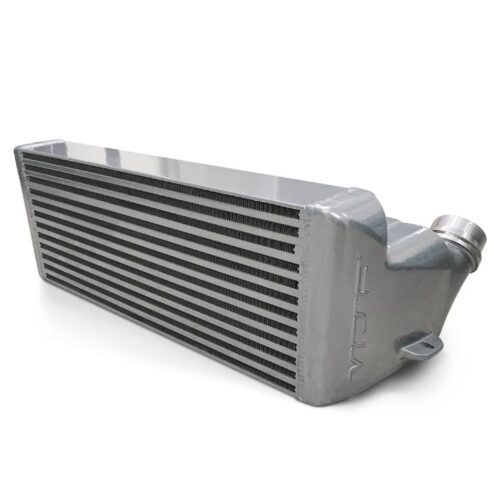
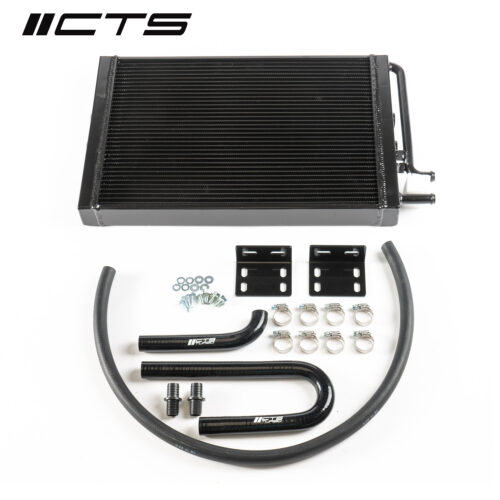
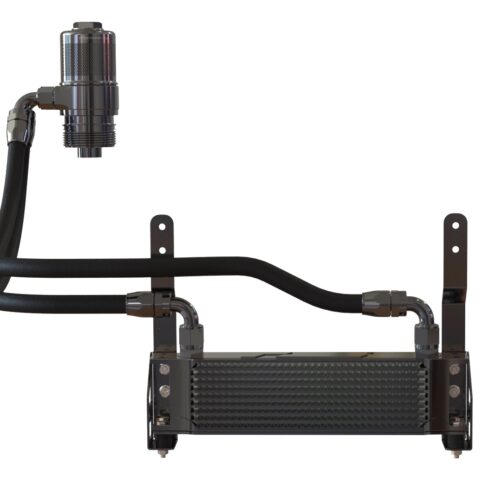

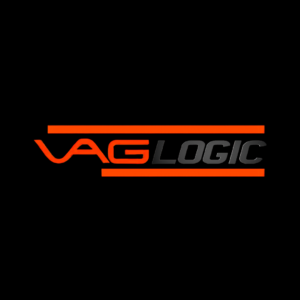

Reviews
There are no reviews yet.